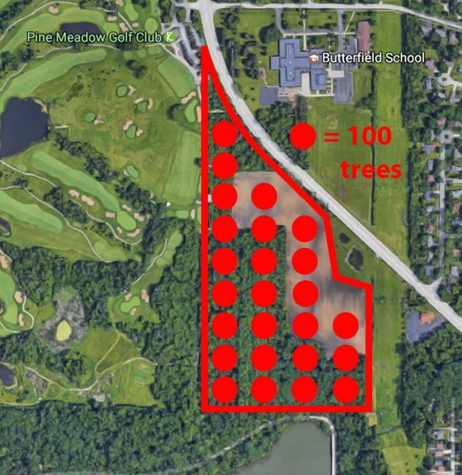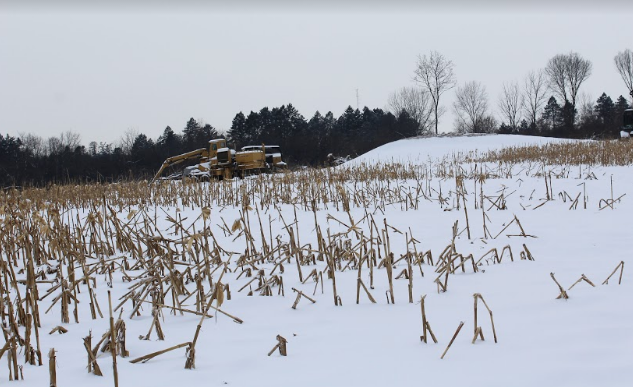Over the past year, Libertyville has seen a lot of potential changes for the future in terms of housing. A particular proposal from Roanoke Group, which calls for 148 single-family homes on 40 acres of land, is the largest proposed development Libertyville has seen in years, according to the Daily Herald, and it involves property owned by the archdiocese of Chicago, along Butterfield Road.
On Monday, Jan. 9, hundreds of community members sat in for the second hearing on the development of the Butterfield Road property, at the Libertyville Civic Center.
This hearing was a continuation of one from September and was initially to be resumed back in December but was postponed again to January.
According to the Chicago Tribune, the hearing “was continued … so developers could further research roadway connections onto Butterfield Road and possible impacts on school enrollment.”
The two main concerns from the public about the property in regards to the hearing were school enrollment and traffic changes.
At the meeting, Libertyville resident Phil Brown presented a slideshow titled “Preserve Libertyville For the Future,” which emphasized these issues among others. In particular, Brown referenced statements found in Libertyville’s Village Comprehensive Plan, which was last revised in 2005: “[any] new development respects that which already exists” and “preserves natural features.”
The majority of community members in attendance expressed displeasure with the development of the property, with concerns about traffic, school enrollment, safety and overall appearance.
In addition to those concerns, last year, the Village Board of Trustees issued a permit to the developer for the removal of around 2,500 trees, according to the Daily Herald, which were primarily from an old tree nursery. The trees themselves were inspected by certified arborists and were deemed unsafe due to their poor condition, according to senior planner Mr. David Smith of Libertyville’s Planning Division.
During the meeting, it was noted that the development of the property could affect enrollment at both District 70 and District 128 schools. The Roanoke Group had Kane, McKenna and Associates, a Chicago law firm, conduct a fiscal analysis report on the impact of this development in reference to both districts and the village in general.
The projected enrollment from the development for both Districts 70 and 128 since March of last year dropped to 142, by 2023.

The red outlined area is the 40-acre land that has been cleared. According to the Daily Herald, 2,500 trees were estimated to be torn down on this land. The majority of the trees removed were from an old nursery.
Photo courtesy of Google Earth
The firm used by the village, Speer Financial, Inc., reviewed the numbers contained in the updated report “to provide an opinion as to the fairness and reasonableness of the numbers and conclusions” and determined that “the fiscal impact is reasonable as presented and the numbers and assumptions were fairly presented.”
The school districts, as well as the village, are projected to receive millions in tax dollars from this development.
District 128 Director of Communications, Mrs. Mary Todoric, explained the district’s view on the situation: “The [Community High School District 128] Board [of Education] has been kept apprised on the proposed development and will most likely remain neutral with regards to this development and any development proposed for D128,” she stated in an email interview.
The developer is currently asking for five zoning actions, including an amendment to the Village of the Libertyville Zoning Map, to rezone the lot for residential use rather than institutional.
In addition, implementing a traffic signal for vehicle access to the property will continue to be a challenge, according to Smith.
The next public hearing will be on Monday, Feb. 27, and will give the developer an opportunity to address the review comments from the committee’s report, as well as public concerns.
At that hearing, the Plan Commission, which Smith is a part of, can recommend approval, denial, approval with conditions or continuation into another hearing. However, the Plan Commission is a recommending body and the final decision rests in the hands of the Village Board, which is comprised of six elected officials and the mayor.
“If the comprehensive plans are approved, the village board must approve the final plot and the final plan,” said Smith. “If the village denies it there, then it is dead.”




![Mr. Abullh Ali, manager/assistant, helps open Queen Yemeni Coffee in downtown Libertyville at 606 North Milwaukee Ave. With the help of employees such as manager and LHS senior Yousef Taha, they are able to bring the Yemeni and Ethiopian culture to Libertyville by using their Queen spices, cinnamon and cardamom in their drinks such as Adani Chai, which is inspired by Sheda, the Queen of Yemen and Ethiopia. “The history of our coffee [is] a long history and we believe that Yemen and Ethiopia started the coffee and we are bringing something unique to the community,” Mr. Ali said.](https://www.lhsdoi.com/wp-content/uploads/2025/04/Photo-1-1200x800.jpg)







